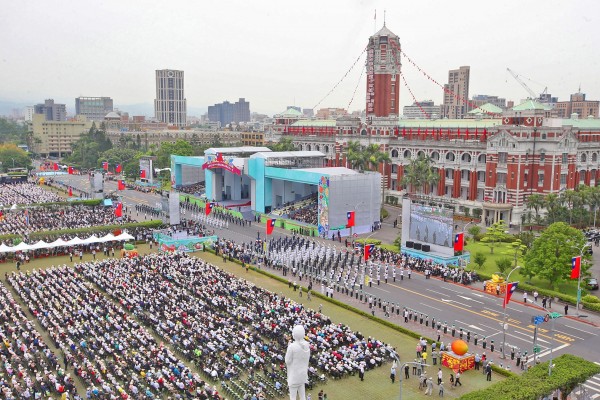《TAIPEI TIMES 焦點》 DPP, PFP laud speech; KMT says full of ‘empty words’

Men and women serving in the nation’s armed forces parade past the Presidential Office Building in Taipei yesterday in celebration of President Tsai Ing-wen’s inauguration. Photo: CNA
WORD COUNT: One KMT lawmaker questioned Tsai’s ‘faith’ in the Republic of China, which she mentioned five times, while bringing up Taiwan more than 40 times
By Loa Iok-sin / Staff reporter
President Tsai Ing-wen’s (蔡英文) inaugural speech drew mixed reactions domestically, with the Democratic Progressive Party (DPP) and the People First Party (PFP) lauding it as showing her determination to solve problems, while the Chinese Nationalist Party (KMT) called it “empty.”
DPP Legislator Lee Chun-yi (李俊俋) said the part in the speech about cross-strait relations was “the best talk Tsai Ing-wen has given in recent years,” extending an olive branch and urging Beijing to respond in a friendly manner.
“It was good that the cross-strait part was only one-fifth of her inaugural speech and she spent more time talking about social issues, which the public considers more important, according to poll results,” Lee said.
DPP Legislator Frida Tsai (蔡培慧) said the president’s speech showed that she is a sincere person who wants to solve problems for the public.
“When President Tsai gave the speech, she was not only talking to people who supported her, but also those who did not necessarily agree with her in the election,” Frida Tsai said.
“She mentioned the challenges that the nation faces and proposed her policy directions. Therefore, we could see that she is sincere about solving problems and shouldering responsibility,” Frida Tsai added.
In a press release, the PFP said the president was “someone who wants to solve problems.”
“She stressed that it is the government’s obligation to solve problems for the people and lead Taiwan into the world, which is also what PFP Chairman James Soong (宋楚瑜) has always insisted on,” the PFP said. “It is agreeable that President Tsai is able to uphold these values.”
“President Tsai has obviously adjusted her campaign policy platforms into something that could be more widely accepted,” it said. “She aims to take care of every Taiwanese. We think this is a positive development.”
As for the president’s comments on cross-strait relations, the PFP said that while she did not directly mention the so-called “1992 consensus,” her respect for past cross-strait agreements shows that she still recognizes it without saying so.
“Hence, there should not be any visible regress in cross-strait relations,” the party said.
The “1992 consensus,” a term former Mainland Affairs Council chairman Su Chi (蘇起) admitted making up in 2000, refers to a tacit understanding between the KMT and the Chinese government that both sides of the Taiwan Strait acknowledge there is “one China,” with each side having its own interpretation of what “China” means.
New Power Party Executive Chairman Huang Kuo-chang (黃國昌) said that “coming from a new president, we can totally understand and respect her rhetoric,” adding that his party’s stance is different, emphasizing the need to push for the “normalization” of current “unequal state-to-state relations” with China.
“Given the domestic and internal environment, she has chosen a moderate and vague common denominator to explain her policy,” Huang said, praising Tsai Ing-wen’s emphasis that the future of the nation should be determined by the people through democratic processes.
“China has to realize that Taiwan’s political system relies on public opinion and the people’s will is what is most important,” Huang said.
NPP Legislator Freddie Lim (林昶佐) said there “was no harm” in Tsai Ing-wen’s “conservative” cross-strait rhetoric, while praising her emphasis on “transitional justice,” including mentioning Aboriginal rights.
However, KMT Central Policy Committee director Alex Tsai (蔡正元) said on Facebook that “Tsai Ing-wen’s inaugural speech was full of empty words.”
“To solve economic issues, she wants to have a ‘new model.’ To reform the national pension system, she would call a national affairs conference; to reform the judiciary, she would organize a national affairs conference; for regional participation, she would create a ‘southbound policy office’; and for energy issues, she promised to set up an ‘energy office,’” he said.
“All she did was put all those textbook terms together,” he said.
KMT Legislator Lee Yan-hsiu (李彥秀) questioned Tsai Ing-wen’s “faith” in the Republic of China, with the president using the term only five times in her speech and only in the section about cross-strait relations, “whereas she brought up ‘Taiwan’ more than 40 times.”
The KMT caucus said it wants the president to provide “concrete numbers” as a standard for her performance, adding that what she said about cross-strait relations has not surpassed the framework of the “1992 consensus.”
KMT Legislator Alicia Wang (王育敏) asked why Tsai Ing-wen did not credit former president Ma Ying-jeou (馬英九) in the speech for the foundation he built.
The American Institute in Taiwan said in a statement that the US looks forward to working with the new government.
“We look forward to working with the new administration, as well as with all of Taiwan’s political parties and civil society groups, to further strengthen the ties between the people of the United States and Taiwan,” the statement said.
Additional reporting by Alison Hsiao, Abraham Gerber and Reuters
新聞來源:TAIPEI TIMES


















